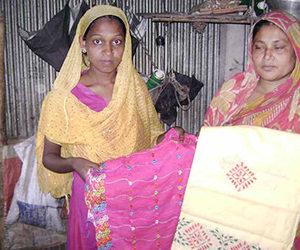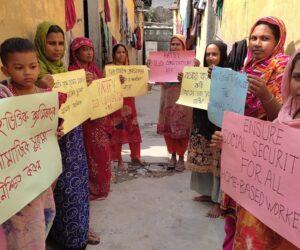Increasing Knowledge and Capacity of Home-based Workers
Overview
A home-based worker refers to an employee who performs his or her job from home, rather than in a designated workspace at any employer’s site. Home-based work is a growing global phenomenon with over 100 million people working from their homes. The number of home-based workers is estimated to be around 50 million in South Asian countries. They perform their responsibilities and tasks from home and usually stay in contact with their employers via phone or orally. This type of arrangement has traditionally been rare but is now becoming popular due to the use of new communication methods. From a human resources perspective, these home-based workers help save companies thousands of dollars a year since the company does not need to provide workspace, job materials, or other amenities, but only pay a piece rate for the products.
In Bangladesh, 71 percent of all women workers, compared to 20 percent of all male workers, are home-based. The number of home-based workers in Bangladesh is likely under-reported due to the informal nature of their work and inadequate recognition by the government. They lack collective bargaining skills and knowledge about OSH and social protection. Besides, they face problems of exploitation, low wages, and a lack of secure contracts. In addition, they have to pay for many of the non-wage costs of production, such as space and storage costs, utilities, and equipment costs, etc. Therefore, BLF has implemented this project in Keraniganj, Dhaka, from January 2022 to December 2022. BLF runs this project with its own funds, covering 250 women, to eradicate these gaps and capacitate these home-based workers. The project components include OSH, GBV, and Organizing.
Objectives
- Identify the gaps of home-based workers to develop a capacity-building strategy for them.
- Develop capacity and skills to enhance the business collaboration of home-based workers.
Project Components
OSH, GBV & Organising
Location
Keraniganj, Dhaka
Donor
Bangladesh Labour Foundation
Duration
January 2022 – December 2022
Stakeholders: Home-based workers, Employers of subcontracting RMG factory, Employers of Local RMG factory, Department of Women’s Affairs (DWA)
Project Intervention: Awareness Sessions, Training, and Campaigns. BLF conducted 40 training sessions on Occupational Safety and Health (OSH), as well as 40 sessions focusing on Personal Hygiene and Reproductive Health.
Key Achievement: In 2022, BLF organized 18 meetings with 270 home-based female workers to increase the awareness on Decent work, social protection, empowerment through leadership development, and health and hygiene practices. In addition, BLF organized the 16 Days of Activism campaign with the informal workers at Keraniganj.







